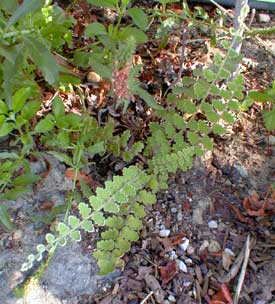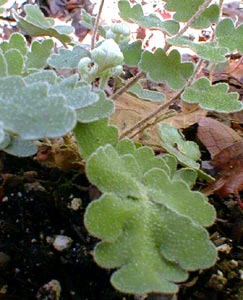
Star-scaled Fern,
Wavy Cloak-fern,
Wavyleaf Fern, or
Silver Wave Fern, or
Jimmy Fern
I want more of this unobtrusive little bugger! I'm afraid people don't even notice it in the garden, as it lays low & grows slowly. But my gosh, a fern that loves a sunny dry spot! Who'd've thunk it?
Astrolepis sinuata sinuata was formerly called Notholaena sinuata & Cheilanthes sinuata, & still sometimes sold under this latter name. We got our first one at a garden fair & it was ages before we saw a second one (& only one) in any local nursery. We now have two of them, & I'll certainly get more for rockery ledges when the chance finally does present itself.
Commonest in Arizona & other southwestern states, it ranges south as far as Georgia, plus the subspecies A. s. mexicana is found deep into Central America. It eventually matures to a foot wide fern, & in the wild two-foot specimens are not uncommon. But our first one in its first year remained healthy without gaining much in size. The second one was a bit more upright in growth habit but still very small. They produce tiny new fiddleheads in autumn & in spring.
 Of its several common names, Star-scaled fern, Wavy Cloak-fern, & Silver Wave Fern appear to be most common. It's my guess the rarer name "Jimmy Fern" was adapted from having the same effect on cattle & sheep as does Jimson Weed. The fern has a toxin that keeps it from being browsed by rabbits or desert rodents, & it is avoided by deer. In regions with limited forage possibilities, toxicity is the only way such a slow-growing little fern would survive.
Of its several common names, Star-scaled fern, Wavy Cloak-fern, & Silver Wave Fern appear to be most common. It's my guess the rarer name "Jimmy Fern" was adapted from having the same effect on cattle & sheep as does Jimson Weed. The fern has a toxin that keeps it from being browsed by rabbits or desert rodents, & it is avoided by deer. In regions with limited forage possibilities, toxicity is the only way such a slow-growing little fern would survive.A scrubland or dry alpine fern, it typically grows underneath evergreen desert & semi-desert shrubs in rocky soil. Positioning it in a garden requires thought, for though it likes vastly more sun than any other fern, & could be regarded a full-sun plant, it does not like to have its roots overheated, so frequently grows between rocks so that its fronds are in the sun & its roots sheltered.
It also needs good air circulation in order to adapt to temperate & moist climates. It requires perfect drainage, as persistent moistness would kill it, & it is especially at risk in wet winters.
It has been completely evergreen in our rockery. The leaf coloration is smoky grey to dusty sage-green on top, softly furred underneath in shades of gold & tan. Young fronds have glittery white scales. If looked at with a magnifying glass, these scales are distinctly star-shaped.